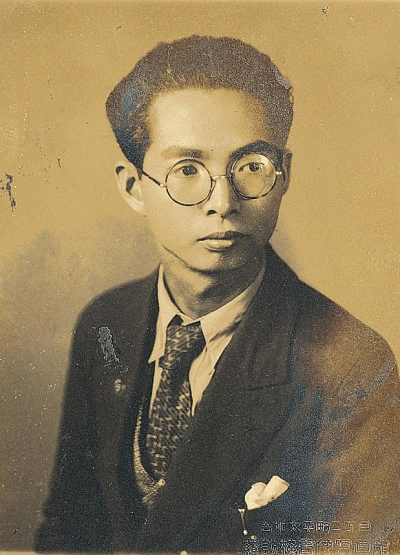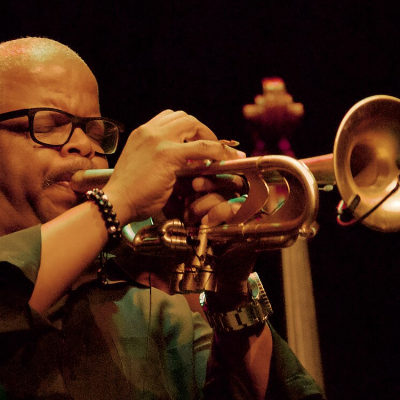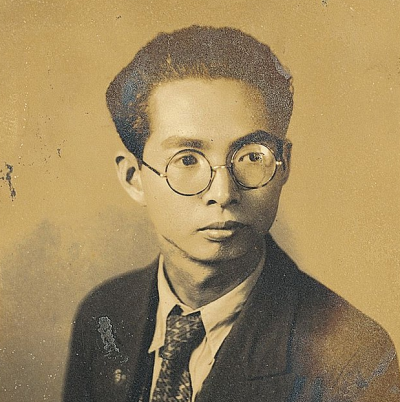.
.
“Song of the Unplayed Record” was a short-listed entry in our recently concluded 68th Short Fiction Contest, and is published with the consent of the author.
.
.
___
.
.
photo via Wikimedia Commons

Ten Yu-hsiem, the Taiwanese composer of “The Torment of a Flower,” also known as “Rainy Night Flower”
.
Song of the Unplayed Record
by Julie Dron
.
…..The incense hung cloud-like in the low ceilinged room as Mei-Ling entered, returning from the rice fields. She glanced up at the brittle black shellac disc that was propped on a high shelf. Its presence was somehow reassuring, that there was another world of possibilities beyond her current harsh life.
….. Wei-Siung, her much older brother, worked for Columbia Records in Taipei, and had brought the record some months ago, tucked under his arm, with money for his parents and new shoes for his sister.
….. “Be careful, it breaks easy!” Wei-Siung had warned, as he slowly removed the round disc from the crinkly brown paper. Only Pa had been allowed to touch, lifting it between his palms and placing it on the highest shelf.
… . “Next time, I’ll bring a gramophone!” Wei-Siung had promised.
….. Aunts, uncles and cousins dropped by, wanting to gaze at and discuss this modern invention. They wanted to hear the sounds with their own ears, before they were sure, before they truly believed, that music was somehow magically ingrained in the grooves. Mei-ling had boasted to her friends that she would soon own a gramophone and perhaps they could have a party, for her twelfth birthday, although she knew deep down that this was unlikely. She focused on such positive thoughts as she helped her father with the water buffalo in the rice fields, her new shoes slung around her shoulders, free of the mud that covered her bare feet. It was puzzling, to her, that they were too poor to eat the rice that they produced, but only a few farmers were brave enough to raise their voices in protest while her family remained silent.
….. Life in the village of Guandu continued throughout the changing seasons, until New Year arrived in the cold damp month of February. An automobile was spotted in the distance, chugging noisily along the country road. Some of the children left their work in the fields or their homework on the kitchen table to chase after the car. By the time it stopped with a screeching of brakes outside Mei-Ling’s house, it had a following like the boats on Tam Sui River that attracted flocks of elegant egrets.
….. Mei-Ling and her parents, hearing the commotion, rushed out to see their beloved Wei-Siung leaping from the automobile and hurry to the passenger side. Mei-Ling’s stomach churned with excitement at the possibility of finally listening to the record. But there was no gramophone. Instead, a small dainty woman stepped carefully from the car, dressed in a shiny tight fitting cheongsam, a shawl arranged artistically around her shoulders, her neat black hair in a smart bob, the red of her lipstick matching the red of her nails.
….. Polite as always, although surprised, her parents welcomed the guest who Wei-Siung introduced as Zhen-Zhen. Wei-Siung followed Zhen-Zhen into the small dwelling, stooping through the low doorway, then looking around as he always did, as if expecting change and finding none. He saw the record, propped god-like above the dusty air, waiting patiently for the stylus to glide across its surface.
….. “Oh, I’m sorry, I forgot the gramophone, I’ve been so busy! Next time!” he promised, while Zhen-Zhen sat carefully on a low stool that ma had hastily wiped. The children who had followed the car peered through the doorway and window, gazing at Zhen-Zhen, convinced she was a film star, or at the very least, someone famous from Taipei.
…..Mei-Ling and her parents gasped when Zhen-Zhen stood and reached up, lifting the record from the shelf, turning it over with her delicate hands. They expected Wei-Siung to lecture her on the fragility of the object, as he had done with them, but he said nothing as he continued to gaze at Zhen-Zhen with adoration.
…..“’Rainy Night Flower,’ my favorite song!” she cried. Wei-Siung explained to his family with obvious pride that Zhen-Zhen was a singer at Columbia Records, and already her beautiful voice was recorded on the shellac grooves. “She knows Teng Yu-Hsien, the composer!” he further informed them. Even here, in Guandu village, they knew of Teng Yu-Hsien who had composed many famous folk songs that were sung in his native Taiwanese Hokkien.
…..“Perhaps you could sing for us.” Ma timidly suggested. Zhen-Zhen stood in the small crowded room that smelt of sweet potatoes and damp wood, and began to sing “Rainy Night Flower.” The words were simple, as was the melody, yet they seemed to speak of generations, of centuries; a voice of the people whose toughness was formed from their quiet perseverance and acceptance of the unfairness of life.
…..There was more singing that evening around a fire, the smoke making them cough but chasing away unwanted mosquitoes. Eventually it was time to drive back to Taipei and Wei-Siung promised again that he would bring the gramophone with him next time, although he was so busy he couldn’t be sure when that would be.
…..It was many months later when he returned, alone, on his rusty bicycle, his face pale and drawn. He looked so thin that his mother clucked over him, worried, as he walked through the small doorway. He looked up at the record as he entered and paused before taking it down from the shelf.
….. “Oh, I forgot again, but you must hide this now, keep it in a safe place until the war is over, then I promise I will bring a gramophone!”
…..Mei-Ling could see that he was pretending to be upbeat and cheerful, but he didn’t fool anyone.
…..“You are careful, aren’t you?” he asked them, as he sat, taking the simple food his mother forced upon him, encouraging him to eat. “You know it’s forbidden now, to sing in Taiwanese? Especially this song, as the Japanese have stolen it, changing the words, turning it into a Japanese military song. I heard that Teng Hu-Hsien died of a broken heart.”
…..Although her life was limited to work on the farm, Mei-Ling understood his meaning, his warnings. At first the war hadn’t touched them, it was something far away, so far away that it only affected strangers, and their simple life had continued with its natural cycle beneath the waxing and waning of the moon. Then her cousin, who was lucky enough to attend the school some distance away, an hour’s walk, was upset because he arrived last month to discover the teacher had left, returning to Japan. A sudden departure, and school – at least for the time being – was no more. It had been his dream to follow in Wei-Siung’s footsteps and to work for Columbia Records in Taipei. Now, he complained to Mei-Ling, his future looked bleak.
…..Yet more terrifying, Mr Zhang, whose family lived in the mining village of Jin Gua Shi, told them with his voice breaking and his hands shaking of the prisoner of war camp, where prisoners were brought from Singapore to work in the goldmine. Rumors and stories had spread, whispered in low voices, of the atrocities committed at the camp. Since hearing such stories Mei-Ling often awoke in the dark of the night, laying on her slim threadbare futon, her heart beating wildly with nightmarish horrors still fresh in her mind.
…..Wei-Siung wanted his family to walk with him to the temple. They were surprised, as lately he’d had no time for the gods that they worshipped. The Matsu temple overlooking the mangrove swamps and river was grand, built by their ancestors who had survived the crossing of the Taiwan Straits from FuJian. The temple protruded from the hill, and Wei-Siung pointed to a small dark entrance that led to a natural rocky corridor within the temple.
….. “Do you know what that is?” he asked, but they looked at him blankly. “It’s an air raid shelter. One day, maybe soon, there may be bombers arriving. Americans. You must run here. Don’t wait to look for each other, don’t return home from the fields. Run straight here. Do you understand?”
…..Mei-Ling saw the confusion on her parents’ worn faces. Now at thirteen and tall for her age despite her poor diet, Mei-Ling experienced the reversal of roles, remaining calm and reassuring while her parents clung to each other with panic at their son’s words.
…..“But why will they come here?” they asked. Wei-Siung looked around suspiciously, lowering his voice.
…..“There is a Japanese air field nearby. All of Taipei may be bombed. We just don’t know. But you must promise me before the gods in the temple that you will drop everything and come straight here.”
…..His parents nodded furiously, agreeing yet confused. They walked back home together but without the jollity that normally accompanied Wei-Siung’s rare visits, and as he was leaving, this time on his bicycle, they waved with sadness, watching his back disappear along the path by the mangroves, his legs pounding the pedals.
…..It was sooner than they expected, a bright May morning, when they first heard the distant drone of the planes. Wei-Siung’s warning words were still fresh in their minds as they stopped work in the fields and fled, leaving the water buffalo, running to the shelter in the temple as Wei-Siung had ordered them. They huddled together with the other villagers, a strange eerie silence hanging heavy in the hot humid air. A sick nausea churned in Mei-LIng’s stomach, threatening to rise, to spill out with a loud retching and screaming, but she forced herself to appear calm, for the sake of her parents.
…..A voice, somewhere distant in the dark tunnel, began to sing ‘Rainy Night Flower’ in their native language, the sadness of the melody dripping through the tense fear that had engulfed everyone. Someone shouted, “Shush, they may hear you! We will all be punished if they hear you singing in Taiwanese!” But someone else called out firmly, “We’re safe, there are no soldiers here!”
….. Mei-Ling wanted to join the singing that was like a lullaby rocking a troubled child to sleep, but her mouth was so dry she couldn’t utter one word. Like a chant, it was both peaceful and defiant and she experienced a strange tranquility, the song enveloping her soul with a warm and unexpected optimism.
….. Someone had managed to reach Guandu from Taipei during the raid, and news that Taipei had been heavily bombed trickled down the corridor. Mei-Ling wondered if Columbia Records had been hit, and prayed that Wei-Siung had kept to his plan of moving to the tea plantations outside Taipei, where Zhen-Zhen’s family lived. The raid lasted far longer than they expected, and Mei-Ling and her parents finally emerged from the tunnel late afternoon, when they believed it was safe. The road to their small house was untouched and the water buffalo was still in the field, waiting, as if nothing had occurred, likely wondering why he had not yet been fed. Mei-Ling shivered as she stood barefoot in the damp field, leading the water buffalo home along the stony path. Shock had left a stark blankness in her mind, yet the singing in the shelter had strengthened her spirit. She had faced death, and was no longer afraid.
.
.
___
.
.

Julie Dron is originally from Liverpool, UK, but currently lives in Taiwan. She began writing in her sixties and has since been published in a wide variety of online journals and printed anthologies, including Synkroniciti, Syncopation Literary Journal, Scottish Arts Trust, Wordrunner eChapbooks, Masticadores Taiwan, Pesto Comics, Inkd Publishing, Dark Moon Rising Publications, West Avenue Publishing, Lucky Lizard Poetry Journal, Graveside Press and many more. She enjoys discovering Taiwan’s rich history and practicing traditional Chinese writing which is now only used in Taiwan.
.
___
.
.
Click here to help support the continuing publication of Jerry Jazz Musician, and to keep it ad and commercial-free (thank you!)
.
“Saharan Blues on the Seine,” Aishatu Ado’s winning story in the 68th Jerry Jazz Musician Short Fiction Contest
Click here to read more short fiction published on Jerry Jazz Musician
Click here to read The Sunday Poem
Click here for information about how to submit your poetry or short fiction
Click here for details about the upcoming 69th Jerry Jazz Musician Short Fiction Contest
Click here to subscribe to the Jerry Jazz Musician quarterly newsletter (it’s free)
.
.
.
___
.
.
Jerry Jazz Musician…human produced since 1999
.
.
.




































